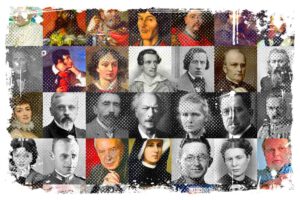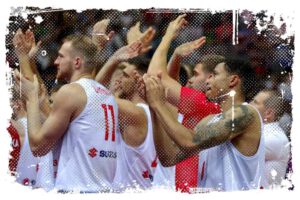Let me tell you about some amazing folks who left a significant mark on the history of Polish football. Now, I know Polish football may not be among the world’s top tiers, but it sure had its moments of glory. And believe me, over a century, a host of individuals have emerged that made everyone in Poland proud of their team and their football. So who were the biggest legends in Polish football history?
Edward Cetnarowski (1877 – 1933)

Without the Polish Football Association, known as Polski Związek Piłki Nożnej in Polish, there wouldn’t be any football in the country. Logically, it could only emerge after the end of World War I, when Poland regained independence.
On December 20-21, 1919, the first assembly of 31 Polish football clubs took place in Warszawa, an event that gave birth to the PZPN. Each club had its representative, including Cracovia. And from its ranks came Edward Cetnarowski, the first president of the organization, which was originally based in Krakowie.
Tadeusz Synowiec (1889 – 1960)

Tadeusz Synowiec is not just a legend of Cracovia but also the man who led the Polish national team as captain in its first-ever historical match. Regrettably, the red-and-whites lost 0:1 to Hungary, with Synowiec playing in midfield.
↳ PRO TIP: Do you like traveling? Then before you buy any ticket or book an attraction, check if it's available in this worldwide Viator Database. You may save a lot of money and time. No need to thank me :)
After hanging up his boots, he wore the hats of a coach and journalist. He led the national team as a selctor and also worked for „Przegląd Sportowym,” a sports magazine co-founded by none other than Edward Cetnarowski.
Józef Kałuża (1896 – 1944)

Allow me to introduce Józef Kałuża, one of the best footballers of the 20th century, who represented Poland from its first match. He’s also a legend of Cracovia. His career spanned more than 450 matches, and he reportedly scored even more goals.
With Cracovia, he became the Polish champion and top scorer in 1921, the first completed league season. He later served as the captain of the national team, essentially becoming the selector of the squad that played in the World Cup for the first time in 1938. It’s worth mentioning his involvement at the World Cup, as it added another feather to his already illustrious cap.
Ernest Wilimowski (1916 – 1997)

Let me tell you about Ernest Wilimowski, a man known as „Ezi” who identified himself not as a Pole or German, but as a Silesian. He was a controversial figure – a hero for some, a traitor for others. Most often, those who call him a traitor are unaware of the realities in which Upper Silesia found itself in the first half of the 20th century.
For this reason, Wilimowski played not only for the Polish national team but also for Germany – or rather, the Third Reich. But, it’s worth mentioning that his fame skyrocketed while playing for the white-and-red „Eagles.”
At the 1938 World Cup, he scored a whopping 4 goals against Brazil! Many believe there has never been a more outstanding player in the Polish team. He’s a legend of Ruch Chorzów.
Kazimierz Górski (1921 – 2006)

I think it’s worth saying that the name Kazimierz Górski is known to just about everyone in Poland. He led the national team to a famous success at the World Cup in Germany, where they finished third.
But that’s not all! He also won a gold medal at the ’72 Olympics and a silver in ’76. Górski is also known for his saying that „the ball is round, and there are two goals.” He received many accolades and also achieved success in Greek club football.
Gerard Cieślik (1927 – 2013)

Let me introduce you to Gerard Cieślik, often considered the biggest star of Polish post-war football before the emergence of Górski’s „Eagles.” He was a legend of Ruch Chorzów, and he also scored an average of one goal every two matches for the national team.
He achieved a multitude of successes with „The Blues” in the ’50s. However, his life nearly took a different turn. In 1945, as a soldier of the Wehrmacht (he was conscripted), he wanted to surrender to the Americans, but they handed him over to the Russians. Cieślik faced the threat of being sent to a Siberian labor camp, but fortunately, he managed to avoid this fate thanks to the intervention of another Silesian footballer, Teodor Wieczorek.
Antoni Piechniczek (1942)

When talking about Górski, it’s worth to bring up the name Antoni Piechniczek. Just 8 years after the 1972 World Cup, Poland took the third place again, but this time with a coach born in Chorzów.
After his time with the national team, he coached teams in North Africa and the Persian Gulf. In 1996-97, he even returned to the Polish team, though with significantly less success. In the 21st century, he also dabbled in politics, which didn’t go particularly well. He now lives in retirement in his house in the mountains, in Wiśla, Silesia.
It’s also worth noting that Piechniczek was also a footballer. He primarily played for Ruch, with which he became the Polish champion in 1968.
Henryk Kasperczak (1946)

I think it is worth saying that Henryk Kasperczak is a complete athlete. He won the Polish championships with Stalą Mielec, played in the national team (he was even part of the team of the century), and made his mark in foreign football both as a player and – quite unusually – as a coach.
He mostly worked in French-speaking places as a trainer. He led the famous Saint-Etienne and a few African teams. With Tunisia, he became the second-best team of the Black Land. Back in Poland, he also had success. With Wisła Kraków, he won three consecutive championships. The only thing missing from his collection is working as the coach of the white-reds.
Kazimierz Deyna (1947 – 1989)

Some say Wilimowski is the most outstanding player in the history of the Polish national team, others mention Kazimierz Deyna. This offensive midfielder enchanted with his technique, which made him a legend of Warszawa’s Legia – although in the capital, they don’t want to remember that he initially did everything not to get there.
After his adventure in Manchester City, he went to play football in the USA. He died in a car accident when, under the influence of alcohol, he significantly exceeded the speed limit and forcefully drove into the back of a parked truck.
Włodzimierz Lubański (1947)

For many years, Włodzimierz Lubański was the top scorer of the Polish national team, achieving very good numbers – 48 goals in 75 appearances. A legend of Górnik Zabrze, where he played for 12 years, earning, among others, 7 championship titles and 4 crowns of the highest league’s top scorer.
If it wasn’t for an injury and the communist authorities, who didn’t want to let him go to the West, his career could have been even more impressive. He managed to play in Belgian Lokeren for a while, where he won the country’s vice-championship. They still remember him warmly in this club.
Jerzy Gorgoń (1949)

Jerzy Gorgoń, a legend of Górnik Zabrze, who achieved success in the national team along with Kazimierz Górski. In the team, he was a bulwark of defense, a rock. He was known for his physical condition, great strength, and powerful long-range shot.
Grzegorz Lato (1950)

While he didn’t earn a reputation as the president of PZPN, no one can take away what he did as a footballer. He achieved success with both Górski’s and Piechniczka’s team. He was a key figure in the 1974 World Cup when he became the tournament’s top scorer. He became famous for playing in Stal Mielec at the club level.
Antoni Szymanowski (1951)
Antoni Szymanowski, often overlooked among attacking players, deserves your attention. Primarily known for his time at Wisła Kraków, he also had brief stints at Gwardii Warszawa and Club Brugge. He played as a full-back in the 70s, making 82 appearances for the national team.
He was indeed one of the best defenders in Poland’s history and earned a spot in the PZPN’s team of the century.
Józef Młynarczyk (1953)
Deciding on the best goalkeeper in the history of Polish football is no easy task. However, I believe it’s worth mentioning Józef Młynarczyk, who was chosen for the PZPN’s team of the century. His accolades speak volumes: not only did he earn a World Cup bronze medal in 1982, but he also triumphed in the European Cup with Porto. After hanging up his gloves, he imparted his goalkeeping wisdom to the next generation.
Władysław Żmuda (1954)
I can tell you that no Polish player has played more World Cup matches than Władysław Żmuda. This defender appeared 21 times over four tournaments (1974, 1978, 1982, 1986), setting a national record. He earned three national championships, attempted to make a name in Italy’s Serie A, and even played in the United States. He then worked as a coach, mainly with the youth.
Zbigniew Boniek (1956)
Allow me to explain about Zbigniew Boniek, a star of the 1982 World Cup, where Poland took third place. During the communist era, he managed to escape the country and play in Italy, specifically for Juventus and Roma.
This helped him secure third place in the 1982 Ballon d’Or race, a feat that Robert Lewandowski later surpassed. As a coach, Boniek didn’t make waves, but he thrived as a sports official. After cleaning up the mess left by his predecessors at PZPN, he became UEFA’s vice president in 2021. He’s often noted for being friends with Michel Platini.
Michał Żewłakow (1976)
Meet Michał Żewłakow. He was the national team’s defensive stalwart during the challenging first decade of the 21st century, a time when the team often disappointed rather than thrilled. Żewłakow began his professional career with Polonia Warszawa and ended it at Legia, playing in Belgium, the Netherlands, and Turkey in between. He’s currently serving as a sports director.
Jakub Błaszczykowski (1985)
Now, Jakub Błaszczykowski is a player who’s second only in terms of matches played for the national team. He made such a splash in Germany that Dortmund’s fans recorded rap songs about him. I think it’s worth saying, however, that injuries cost him many games. But, when on the pitch, he always gave his heart and you could count on him. He started his journey with Wisła Kraków and there he ended his career too.
Łukasz Piszczek (1985)
Next up is Łukasz Piszczek, part of the Polish trio at Dortmund that put our red-and-white football on the European map. Hailed as one of Poland’s best defenders, he found a place in the PZPN’s team of the century.
Even Jurgen Klopp, the renowned coach, labeled him as one of his favorite players. He would have likely played more for Dortmund, just like Błaszczykowski, if it weren’t for injuries. After leaving Germany, he returned to his hometown Goczałkowice, where he continues to contribute to the local club and his own academy.
Robert Lewandowski (1988)
Now, I am convinced you’ve heard of Robert Lewandowski. He’s still playing, yet he’s already a legend. Is he the best Polish player in history? That’s likely to be a topic of debate for decades.
However, what he’s achieved at the club level is exceptional in Polish standards. Even though he has the most appearances and goals for the national team, he has not yet matched his 70s and 80s counterparts who wore medals around their necks. That’s the only blemish in his career.
His club adventures, however, are an absolute top tier. Not everyone can challenge Lionel Messi and Cristiano Ronaldo, even for just 2-3 seasons. Had it not been for COVID, Lewandowski might have been the Ballon d’Or winner. Instead, he had to settle for second place in the next edition and two titles of FIFA’s best player of the world.
References:
- https://pl.wikipedia.org/wiki/Historia_reprezentacji_Polski_w_pi%C5%82ce_no%C5%BCnej_m%C4%99%C5%BCczyzn
- https://pl.wikipedia.org/wiki/Reprezentacja_Polski_w_pi%C5%82ce_no%C5%BCnej_m%C4%99%C5%BCczyzn
- https://pl.wikipedia.org/wiki/Kategoria:Polscy_pi%C5%82karze



